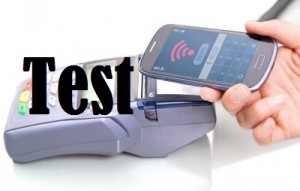Samsung tests Samsung Pay in South Korea
Samsung begun testing its new mobile payments platform in South Korea. Called Samsung Pay, the platform aims to become one of the most effective ways for consumers to make mobile payments, competing with other services from companies like Apple and Google. The platform has already generate some degree of hype, and Samsung has tentative plans to release it at some point later in the year, but has yet to announce an official launch date.
Samsung Pay to use magnetic secure transmission to make mobile payments accessible
Samsung Pay works in a similar fashion to other mobile payments platforms, leveraging NFC technology and biometrics in order to authenticate a mobile transaction. The biometrics that the platform uses, which is a fingerprint scanner, will make transactions secure, effectively protection consumer financial information as they use Samsung Pay to purchase products. The platform also makes use of magnetic secure transmission, which is a similar to the magnetic strips that are associated with traditional credit cards.
NFC technology has yet to see widespread adoption among retailers
 NFC technology is one of the staples of mobile payments, but relatively few retailers have yet to embrace the technology. There are few NFC-enabled point-of-sale systems, which has limited the growth of mobile payments in physical stores. This is why Samsung Pay’s magnetic secure transmission may be a boon, as it will allow the platform to work with conventional point-of-sale systems in order to make mobile payments possible.
NFC technology is one of the staples of mobile payments, but relatively few retailers have yet to embrace the technology. There are few NFC-enabled point-of-sale systems, which has limited the growth of mobile payments in physical stores. This is why Samsung Pay’s magnetic secure transmission may be a boon, as it will allow the platform to work with conventional point-of-sale systems in order to make mobile payments possible.
Competition in the mobile payments field continues to grow as companies enter into the space
Samsung will be facing harsh competition in the mobile payments space, much of which will come from Apple. Google also plans to launch its own mobile payments platform. This competition will give consumers plenty of options when it comes to mobile payments, but companies may find it difficult to keep the attention of consumers for long. Many consumers have yet to show loyalty to a singular platform, favoring the ability to jump from one platform to another in order to find the most benefit.
It may soon be possible for customers of Lloyds Bank to use their contactless card to authorize smartphone transactions.
Customers of Lloyds Bank who have both a contactless debit card and who have an NFC technology enabled device may soon be able to combine the two in order to enhance the mobile security of the banking app so that they can authenticate their identity.
The authentication tech has been nicknamed “tap to bank” and the pilot program involves 125 people.
The participants in the mobile security experiment will replace the current authentication method that uses call to mobile, with a quick tap of the contactless debit card against the smartphone. According to Lloyds Bank, this type of authentication feature could one day be broadened to complete other types of task, as well, such as for the verification of new payments.
It is clear that this new mobile security technology is only at the very beginning of its use by the bank.
 According to Marc Lien, the Lloyds Bank director of innovation and digital development, “With the widespread take up of contactless cards and most new smartphones now having NFC technology, this tap to bank trial is developing enhancements to banking processes that many people could benefit from.”
According to Marc Lien, the Lloyds Bank director of innovation and digital development, “With the widespread take up of contactless cards and most new smartphones now having NFC technology, this tap to bank trial is developing enhancements to banking processes that many people could benefit from.”
The bank is also currently working to replace the automated authorization phone calls that are currently used for the confirmation of certain transactions completed over desktop, as well. In that case, the user can verify requests by logging into the mobile banking app.
That process will be available to individuals who are setting up repeat orders, who are establishing new beneficiaries, who will be making an international payment, or who will be resetting their passwords by way of Internet Banking over a laptop or desktop computer.
Lloyds has explained that these new methods of authentication by way of mobile security technology makes the process considerably faster and more convenient than the automated phone call. Its current estimates are that the entire process could now be done in under 20 seconds, when compared to the lengthier method using the automated calls. Mobile banking is becoming increasingly important among the bank’s customers and is more than likely a driving factor behind this experiment.
 NFC technology is one of the staples of mobile payments, but relatively few retailers have yet to embrace the technology. There are few NFC-enabled point-of-sale systems, which has limited the growth of mobile payments in physical stores. This is why Samsung Pay’s magnetic secure transmission may be a boon, as it will allow the platform to work with conventional point-of-sale systems in order to make mobile payments possible.
NFC technology is one of the staples of mobile payments, but relatively few retailers have yet to embrace the technology. There are few NFC-enabled point-of-sale systems, which has limited the growth of mobile payments in physical stores. This is why Samsung Pay’s magnetic secure transmission may be a boon, as it will allow the platform to work with conventional point-of-sale systems in order to make mobile payments possible.
 According to Marc Lien, the Lloyds Bank director of innovation and digital development, “With the widespread take up of contactless cards and most new smartphones now having NFC technology, this tap to bank trial is developing enhancements to banking processes that many people could benefit from.”
According to Marc Lien, the Lloyds Bank director of innovation and digital development, “With the widespread take up of contactless cards and most new smartphones now having NFC technology, this tap to bank trial is developing enhancements to banking processes that many people could benefit from.”